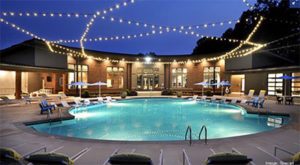 ATLANTA — Gwinnett County is seeing a great deal of apartment development, indicative of the area’s growth in both population and economic development.
ATLANTA — Gwinnett County is seeing a great deal of apartment development, indicative of the area’s growth in both population and economic development.
With a rental growth rate of 5.9 percent year-over-year, Atlanta ranks in the top five performers among American cities, according to the latest figures from Reis, the real estate arm of Moody’s Analytics. The U.S. average was 4.1 percent at the end of the third quarter.
“Multifamily development or apartments, as well as townhomes and mixed-use projects, are being undertaken throughout metro Atlanta and Gwinnett County,” said Dan Reuter, deputy director of planning and development for Gwinnett County.
In February, the Gwinnett County Board of Commissioners adopted the 2040 Unified Plan, which will guide development in the area for the coming years. To encourage denser residential development, which includes multifamily residential and mixed-use projects, the plan designates areas called Activity Centers, Employment Centers and Vibrant Communities on a future development map.
“The 2040 Unified Plan is a bold and innovative vision,” Reuter said, “which the board uses on a monthly basis to make decisions during evaluation of rezoning applications.”
In March, OREI Princeton Heights Property Owner LLC, an affiliate of Miami-based One Real Estate Investment, bought Princeton Heights Apartments, a 300-unit apartment complex on Jimmy Carter Boulevard, for almost $35 million. A couple of months later, Centennial Holding Co. LLC, the real estate company led by former Augusta National Chairman Billy Payne, purchased a 248-unit project near Coolray Field, home ballpark of the Gwinnett Stripers, the Atlanta Braves’ Triple-A team. The apartment complex, which cost almost $43 million, has since been renamed Century at the Ballpark.
In September, south Florida and Atlanta-based real estate investment firm PointOne Holdings broke ground on Sugarloaf Grove, a multifamily community on Duluth Highway across from the Sugarloaf Mills shopping mall. When completed, the 194-unit luxury garden-style complex will feature a pool deck with outdoor cabanas, fitness center, on-demand technology and a dog park with a dog wash facility.
Also making real estate headlines in September, Indiana-based The Sterling Group purchased Berkeley Landing, a 240-unit Duluth apartment complex, for a reported cost of slightly more than $34 million. The garden-style apartments, located at 3700 Peachtree Industrial Blvd., are about two miles from downtown Duluth.
Positive demographic and economic trends in Gwinnett County in general and Duluth in particular served as prime attractors for Sterling Management Ltd., which is overseeing development of the property.
“Rent growth is steady and positive, beating the metro average,” said Tara Smith of Sterling Management. “Duluth’s pro-business economy shows that the submarket will continue to absorb all new units coming into the market.”
Sterling’s plans for Berkeley Landing call for $3.5 million in capital improvements and renovations, Smith said. New appliances, granite, cabinetry, plank flooring and internal fixtures are on the list of items due for replacement. Exterior changes include some roof replacement, replacing select doors and windows, landscape improvements, asphalt and concrete repair, balcony and deck repairs, painting and cleaning. New fitness equipment, the installation of a dog park and grilling stations are on the way, she added.
“We’re investing around metro Atlanta, continuing to build a foundation and our brand in the market is key,” said Smith.
Recently, Atlanta-based apartment giant Cortland bought the 296-unit Echo Lakeside apartments in Peachtree Corners, reportedly at a cost of $66.1 million. For decades, the property contained low-rise brick office buildings as part of Technology Park, a location targeted for residential density by Peachtree Corners city officials and developers. The apartment grounds are adjacent to two lakes with docks and a walking trail that connects with existing trails in Technology Park.
“We like Cortland Peachtree Corners’ location for several reasons, including its easy access to the Buckhead office market via Peachtree Industrial Boulevard and its location within Technology Park, which is home to over 25,000 jobs,” said Jim Knight, Cortland’s director of investments for Atlanta.
Cortland’s decision to invest in the Echo Lakeside apartments also reflects a comparative analysis with the market for condominiums and townhomes. Knight was optimistic about solid rent growth for the foreseeable future, citing a relatively limited supply forecast due to more restrictive multifamily zoning combined with anticipated metro area job growth.
“When you factor in the true costs of home ownership including transaction costs, maintenance and property taxes, apartment living is often more affordable,” Knight said, “especially when you consider access to amenities such as a pool, fitness center, dog park and a clubhouse.”
Recent studies, including a report published by the nonprofit Urban Institute, indicate a trend away from home ownership and toward renting, especially among millennials. The home ownership rate among millennials (ages 25 to 34) is 8% lower than baby boomers and 8.4% lower than Gen Xers. A number of factors play into the trend, including: a preference for living in cities, where single family home costs are high and supply is low; an unfavorable debt-to-income ratio caused by student loan obligations; and tightening credit standards, making it more difficult for people to secure credit to buy a home.
APARTMENT LIVING AT A GLANCE
Rental growth rate (year-over-year) among American cities:
1) Phoenix (7.0%)
2) Raleigh-Durham (6.8%)
3)Charlotte (6.4%)
4)Colorado Springs (5.9%)
5) Atlanta (5.9%)
The U.S. average rental growth rate was 4.1 percent at the end of Q3 of 2019.
Source: Reis Real Estate Solutions